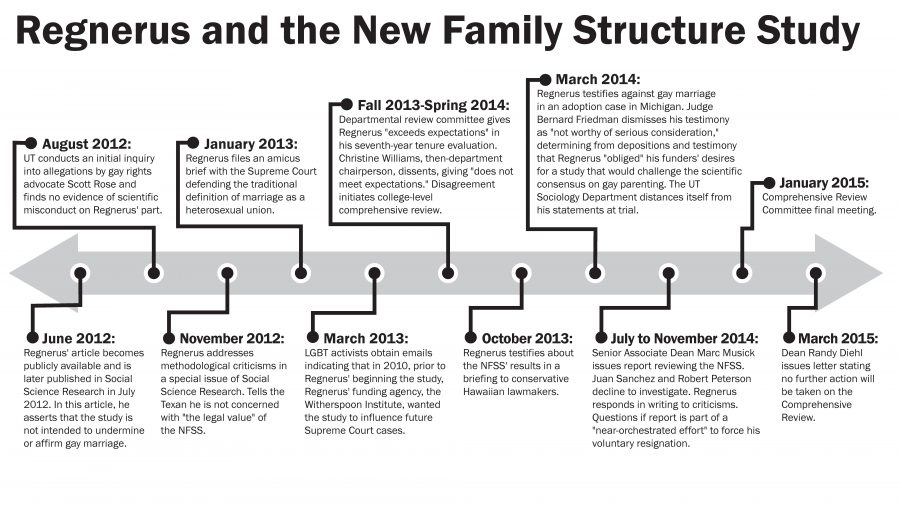Editor's Note: This editorial has been updated with a copy of the letter sent to Crosnoe.
As another gay marriage case goes before the Supreme Court, Mark Regnerus has once again been spared further university scrutiny for his New Family Structures Study.
Since 2012, the associate sociology professor has courted controversy for publishing observed differences between the children of parents who had a same-sex relationship and children living with both biological parents that suggested that the latter do better than the former in life. The criticisms have focused mainly on flaws in the study’s methodology, which established no causal link between the parents’ sexuality and the observed outcomes. Ethical concerns also include Regnerus’ alleged misuse of his findings in court and failure to stop misuse and misrepresentation of his findings by conservative groups such as Focus on the Family and the Heritage Foundation.
In early March, College of Liberal Arts Dean Randy Diehl wrote a letter, obtained by the Texan through an open records request, to Robert Crosnoe, chair of the sociology department. In the letter, it is revealed that despite objections from key figures in the college, no action will be taken on the ethical concerns raised about the NFSS, and Regnerus’ post-tenure, or six-year performance, review rating will remain “exceeds expectations.”
The twists and turns this story has taken are sometimes convoluted, but the potted history, at least as it pertains to this letter, is thus:
When Regnerus’ post-tenure review committee met in 2013-2014, it determined that his performance “exceeded expectations” based on his publication record. However, then-department chair Christine Williams disagreed, citing the controversy surrounding the methodology and conclusions of the NFSS.
This disagreement triggered a college-level review, which in this case involved seeking “expert guidance” from Marc Musick, the college’s senior associate dean for student affairs as well as a noted sociologist himself. Diehl asked Musick to prepare a report, which addressed both methodological and ethical issues, including Regnerus’ use of his study in legal briefs and testimony against gay marriage and his half-hearted attempts to correct the public record on his findings.
Because Diehl felt that the post-tenure review committee was not an appropriate venue to discuss ethical concerns, he deferred to Robert Peterson, associate vice president for research, and his supervisor, Juan Sanchez, vice president for research. They did not believe that the charges leveled met the standards of scientific misconduct and declined to investigate.
The post-tenure review committee met again in January of this year and was tasked by Diehl with considering only methodological problems. Based on this charge, the committee found the following, as summarized and endorsed by Diehl: “Valid methodological concerns have been raised. … A key one is this: Because the design of the study ensured that the parental same-sex relationship variable was confounded with the family structure stability variable, it is not possible to conclude that the different life outcomes between the two groups were caused by the parental relationship variable.” Diehl, citing this finding and Regnerus’ original caution that the article did not deal with same-sex marriage legal rights, agreed that “no policy implications about same-sex parenting should be drawn from the study.” But the fact is Regnerus did use those findings in court.
While we are cheered by the committee’s findings and Diehl’s endorsement, we are disappointed that he didn’t act on the serious ethical dilemmas caused by Regnerus’ reckless misuse of his study, not only because they don’t even give Regnerus a slap on the wrist, but also because his assertion that post-tenure review committees should not concern themselves with ethical issues sets a dangerous precedent and is also inconsistent with the University’s Comprehensive Periodic Review Guidelines. Section 10 of the guidelines states that “incompetence, neglect of duty, or other good cause” may be used to to initiate “appropriate disciplinary action.”
That is to say that Diehl could have seized on the opportunity to review Regnerus’ ethical standards.
But he shamefully chose not to.
Instead he chose the path of least resistance. Diehl sees it differently, of course. He wants to close this chapter of the college’s history so that it can move on. He closes the letter by saying, “I am concerned that recent events and the strong feelings they have evoked have tended to disrupt the strong level of collegiality that has characterized the Department of Sociology over the years. Accordingly, I hope that you will take steps to restore harmonious working relations among all of your faculty and, in particular, to re-engage Professor Regnerus in the life and work of the department.”
We don’t fault Diehl for having the impulse to keep the peace, but it should have been outweighed by the blinding scientific errors and ethical lapses demonstrated by Regnerus.
Regnerus’ post-tenure review decision is final. However, for years now, Regnerus has turned a blind eye, and contributed directly, to the perversion of his findings by right-leaning activists. Diehl shouldn’t repeat his mistake. Instead of sitting idly by, he should take real action and more forcefully condemn not just the methodological, but also the ethical, shortcomings of Regnerus’ work.
Diehl's letter:
Musick's report:
Regnerus' response:
















